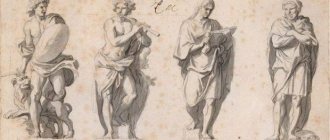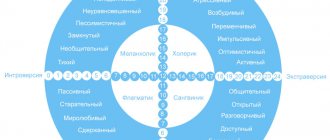What type of temperament is the best and how to determine it by a person’s behavior? Have you noticed that some people try to fit into the company, behave relaxed and confident, others, on the contrary, remain in the shadows and do not attract attention. This does not mean that one of them is worse or better, just that each person has a different temperament and, accordingly, different behavior patterns.
Properties of temperament
Before determining the main type of temperament, it is worth studying its properties. They are based on different human reactions to certain stimuli:
- Activity is manifested by the flow of energy emitted by a person to the world around him.
- Reactivity is a manifestation of a certain force and energy that affects a person’s reaction, like external stimuli.
- Sensuality manifests itself in a mental reaction to internal and external stimuli with a certain degree of intensity.
- The pace of reactions helps to see how quickly a person reacts to circumstances. How long does it take for him to do something or show an emotion?
- Rigidity manifests itself in the time period during which a person adapts to external factors. The ease and speed of perception is considered. A rigid person has a hard time accepting changes and does not want to change his line of behavior.
- Extra- and introversion show the overall activity of the body.
Definition of the concept
Called temperamentum in Latin, it is a combination of individual characteristics that characterize the sensory (affective) and dynamic spheres of his higher nervous activity (that is, comprehension, emotional reactions and behavior). This is a certain psychological foundation on the basis of which an individual develops and which determines a number of social properties of the psyche that contribute to the adaptation of people in society.
Historical reference
There was talk about temperament back in the 5th century BC. But only in the 18th century this issue was approached from a psychological point of view, having identified a number of stable qualities that are given to an individual by nature and directly affect his mental activity.
Teachings of Hippocrates
The founder of ideas about the innate characteristics of a person is considered to be this ancient Greek thinker and healer, who divided people into four substances predominant in the body: black and yellow bile, phlegm (mucus), blood. His follower was Claudius Galen, who listed the main types of temperament based on physiological differences.
Other concepts in the diagram
Over time, many researchers arose who devoted their work to the study of temperament.
Our days
There are 3 fields of psychophysical activity that are influenced by a person’s innate character traits:
- The level of overall intensity of interaction between the individual and the world. It can manifest itself in lethargy and passivity, excessive energy, or occupy an intermediate position between these extremes.
- Mobility. It is expressed in the speed and sharpness of movements and phrases. Accordingly, in this path people are divided into fast and slow.
- Emotionality. It is related to how often an individual’s emotional state changes, how susceptible and vulnerable he is.
Depends on temperamental characteristics
- The pace of work and the rhythm of life.
- The power of emotions, will, the ability to take control of psychological processes.
- Speed of perception, concentration, thinking.
- Discipline and self-discipline.
- Extroversion and introversion.
Doesn't belong to temperament type
- Character. It can change as we grow older, socially interact, and develop habits.
- Capabilities. This concept refers to how deeply, quickly and easily an individual masters new skills and knowledge and is not subject to natural behavioral characteristics.
Individual traits that are not subject to change are the basis for the development of human qualities and attitudes. These are peculiar superstructures that determine the methods of communication and behavior of an individual, but do not in any way affect whether a child grows up capable or not. However, knowing what traits predominate in this mental foundation of the baby, you can choose the most effective methods for his upbringing. As an adult, understanding which group you belong to will give you the opportunity to find effective tools and mechanisms for working on yourself.
Choleric
He is a fairly strong-willed person with a strong character. He is not afraid of difficulties and is ready to take on difficult tasks. He is confident in his abilities, therefore he is able to adapt in difficult situations, protect himself and the weak. They make excellent speakers and leaders. Inner strength and the ability to persuade help them successfully lead a large group of people.
The choleric person is quite jealous, so in his personal life he treats his partner as property. He easily falls in love and becomes attached to a person. In family life he initiates scandals.
It is difficult to restrain emotions, so you should expect straightforward statements from a choleric person. Nevertheless, he has no equal in oratory skills - he is able not only to speak beautifully, but also to convince, winning in an argument.
Choleric children are distinguished by their capriciousness. They try to attract the attention of all family members. In adolescence they become hyperactive, changing tastes and hobbies quite often.
Minuses:
- incontinence;
- impulsiveness;
- haste;
- straightforwardness;
- harshness towards the actions of others;
- periodic aggression.
Advice
:
It is recommended that representatives of this type of temperament work on their emotions. In order not to rush headlong into the pool and do something stupid, you should use the ten-second technique. It lies in the fact that before taking a decisive step, you need to count to ten in your head and then act. Usually, the ardor and intensity of passions disappear, allowing you to make a more informed decision.
What is temperament? What is the difference between temperament and character?
Temperament is an innate combination of human properties, which manifests itself in the characteristics of behavior, reactions and ways of interacting with the outside world.
Depending on temperament, a person’s life can be colored by various emotions. It is believed that temperament, unlike character, is precisely an innate feature. However, over the course of life, many factors influence the way of thinking and behavior, people acquire the armor of life experience, which is why it is easier to determine and evaluate the temperament of a child than of an adult. Parents and teachers can and should learn to determine the type of temperament and use the knowledge gained to build the right strategy for communicating with children and their quality education.
The manifestation of temperament can be observed in all areas of life: the style of contacts with other people, reactions and attitudes to various events, the speed of information processing, the pace and types of thinking, and much more. Since temperament is a combination of mental and physiological characteristics, it is impossible to educate it, unlike character.
It is believed that temperament is one of many manifestations of character. While temperament is determined by the innate type of nervous organization, character is formed under the influence of the following environmental factors:
- family norm and way of life,
- parenting style,
- cultural environment,
- social status, etc.
The process of character formation continues throughout life, and a special role in this is played by the experience of a person’s interaction with society. Therefore, as a result, we can say that the type of temperament lays the foundation of character, and the life experience gained gives it more uniqueness and individuality.
Sanguine
These are cheerful and active individuals. They rarely lose heart and try to find a way out of any situation. People are drawn to them because they are also great speakers. Their speech is quite competent, voluminous and interesting. Unlike choleric people, they do not manifest themselves as dictators, but they can start and lead a crowd.
Sanguine people are very active. They find it difficult to sit in one place. Their daily routine is quite busy. People tend to travel and change their place of residence. Please note that among sanguine people there are quite a few actors and artists. They know how to make people fall in love with themselves, demonstrating their love for life and everything new.
The degree of excitation of the nervous system is high, and the threshold of inhibition is low. This means that a person perceives the world through the prism of some of his illusions. But it cannot be said that a sanguine person is constantly in the clouds. Yes, he can remember ridiculous events, but forget significant dates, such as the birthday of loved ones, for example.
Sanguine people are able to please. They show their emotions, are not afraid to cry, sympathize, and laugh. Their sincerity is not feigned. These people want to be open, but they also want to be treated the same way. It is easy to recognize a sanguine person in a crowd. He will be among a large number of people who listen to him carefully. When talking, a sanguine person gesticulates a lot, which is another feature for recognition. They are distinguished by extraordinary thinking. These people are always learning something, trying to learn new things, changing their haircuts, image, and the interior of their apartment.
Sanguine people are good friends. They do not abandon a person in trouble, and always rush to provide all possible assistance. In their personal lives they turn out to be flighty personalities. Their sociability prevents them from building a harmonious union. Not all partners understand the need of sanguine people to communicate with other people.
Flaws:
- gets down to business, but rarely completes it;
- does not like monotony;
- often overestimate their capabilities.
Advice
:
Sanguine people should work on developing willpower, learn discipline and rely only on their own strength.
Types of human temperament and their characteristics: comparative table of types
| Name | External signs | Features of speech | Specifics of communication |
| Choleric | Moving eyes, lips form a straight line, the gaze covers the entire space in which it is located. | Quick response to a question asked, as well as the overall pace of response. | In a conversation with several interlocutors, he strives to maintain eye contact with everyone and makes decisions hastily. |
| Sanguine | The corners of the mouth are raised upward, the angle of vision is wide. | Often switches from one topic to another, speaks fluently. | He tries to keep his gaze on each participant in the polylogue. |
| Phlegmatic | Looks as if deep into himself, the lip line is smooth and straight. | Slow, long pauses in conversation. | The gaze is directed only at the one to whom the phlegmatic person is directly addressing. |
| Melancholic | He looks more inward than at those around him, the corners of his lips are downturned. | The pace is average, there is uncertainty in the voice. | Maintains eye contact only with the person with whom he is currently speaking. |
Psychologist Daria Milai
Make an appointment
Phlegmatic people
If among your friends there is a balanced person who has an analytical mind, then most likely he is a phlegmatic person. This guy is pretty lazy. He doesn't like to fuss, preferring to just go with the flow. He thinks through all his steps in advance and is not considered an impulsive person.
The phlegmatic person is stingy with emotions. It is difficult for him to show feelings of joy and pain. They won't shed a tear. Their emotional state resembles a scale. They are able to withstand heavy loads. This type of person is not the first to make contact. They find change difficult. If they have to change something suddenly, they feel disorientated for a while.
They are hard workers at work. It is not difficult for them to do monotonous work. Phlegmatic people are ready to understand the problem, analyze and remember a large amount of information.
This type of people is hidden and reserved. It is difficult for them to find new friends and be the first to show interest in the opposite sex. If he really likes someone, he will do everything to achieve their favor. Phlegmatic people start a family late. For them, this is a responsible step, so it takes them a long time to make a choice.
Disadvantages of the type:
- poorly adapt to changes;
- are not the first to make contact;
- show emotions sparingly.
- are slowly starting to work.
Advice
:
A recommendation for a phlegmatic person is to fight his laziness and isolation.
Teachings of Pavlov I.P.
In fact, people who can clearly identify one specific type of temperament are rare. In most cases, we should talk about the predominant features inherent in one or another option, which are complemented by others in different proportions. For example, you may more often express yourself as a phlegmatic person, a little less often as a melancholic person, even less often as a choleric person, and in exceptional cases as a sanguine person.
Criteria for determining temperament
- The relationship between the processes of excitation and inhibition.
- Metabolic speed.
- The power of emotions.
- Features of physiological structure.
Based on 3 components
The research of the Russian scientist explains the manifestation of certain traits from a physiological point of view: in each representative a certain type of higher nervous activity (HNA) prevails, which indicates the existence of a predominant temperament.
Process characteristics
- Strength (S)/weakness (DC). Shows how long an individual is able to maintain performance under prolonged loads and stress resistance.
- Balance (U)/imbalance (N). How easily a person can remain calm in an emotionally provoking environment and control himself.
- Mobility (P)/inertness (I). The influence of inhibition and excitation, the predominance of one over the other.
Correlation of nervous system types
- Choleric - S-N-P.
- Sanguine - S-U-P.
- Phlegmatic - S-U-I.
- Melancholic - Sl-N-I.
Melancholic people
If you see a person who panics because of unimportant troubles, then this is a melancholic person. He tends to dramatize everything, experience depression and mood swings.
They view all events in life as black and white film. Melancholic people rarely rejoice, but often worry. They tend to hide their mood by putting on the mask of a happy person. Because of this, there is a high percentage of suicides among melancholic people.
At work they are just as uninitiative, sluggish and lazy. It is difficult for them to quickly get involved in the process, analyze and adapt. This type does not remember information well.
A person experiences multiple complexes. He is not confident in himself and is sensitive to criticism. It cannot be found in noisy companies or among most colleagues at work. Such individuals prefer to sit in the archive, library, or work as a storekeeper. It is difficult for a melancholic person to find a soul mate or friend. Their pessimistic attitude scares off many people. They choose one of the sanguine or choleric people as close friends. This is understandable. Melancholic people need care, which can be given by strong personalities. People get married late or simply rarely. Because of their indecisiveness, many partners simply leave without waiting for action. If they manage to arrange a family life, then they will be happy there with a strong personality. For melancholic people, a home is a fortress and a reliable rear, so they arrange it with special love.
Flaws:
- indecisiveness and self-doubt;
- depression;
- mood swings;
- difficulty perceiving the world.
You should not expect courageous actions from a person. But melancholic people also have advantages. These individuals are very kind and sympathetic. It is not difficult for them to lend a helping hand and share food with those in need. They understand how difficult it is to remain alone in a strange world.
Advice:
A melancholic person should not withdraw into himself. It is recommended to travel, dance, or find another hobby you like that will distract you from pessimistic thoughts.
How to determine a child's temperament?
So, we understand that there are innate types of temperament. In order for an adult to be able to organize and adjust the educational and educational process, enhancing the best qualities and leveling out shortcomings, as well as to help and adapt in various life situations, one must be able to identify and understand children's temperament. It is impossible to use a universal approach: a choleric person will loudly oppose the new rule, a phlegmatic person will simply silently not budge. The sanguine person will complete the same task hastily, with loss of quality and, possibly, dubious results, quickly moving on to the next one. A melancholic person will work long, painstakingly and carefully towards one goal to the detriment of the amount of work done.
Therefore, determining a child’s temperament is an important step towards forming strong and high-quality connections between a child and an adult.
Hippocrates' teaching on types of temperament
Hippocrates (an ancient Greek physician) understood temperament as the anatomical, physiological and individual psychological characteristics of an individual. Hippocrates, and later Galen, spoke of temperament as the behavioral characteristics of an individual in whose body one of the four “vital juices” is predominant.
- In choleric people, yellow bile (“bile, poison”) predominates, which makes him impulsive and uncontrollable.
- In phlegmatic people, lymph (“phlegm”) predominates, which makes a person calm, calm, and slow.
- In sanguine people, blood (“blood”) predominates, which makes him cheerful and active.
- In melancholic people, black bile (“black bile”) predominates, which makes him timid, fearful, and sad.
The influence of temperament on human life
Each of us is individual. The course of life depends on perception, life situations, as well as one’s own internal beliefs. One way or another, life experience makes its own adjustments to the worldview and type of behavior - character.
Signs of depression in men, its causes and independent struggle
Sanguine people make good leaders. They are very calculating and know well how to win over their interlocutor. Bright professions are suitable for such people (administrators, teachers, journalists, doctors, managers, salespeople, economists, lawyers, technologists, waiters, etc.). Sanguine people do not like monotonous work, so, most likely, such professions as archivist, jeweler, restorer, accountant will not suit them.
Cholerics are excellent leaders, good, fair bosses. Such people quickly adapt to changes and easily change their environment. Choleric people are well suited for those professions that require large amounts of energy:
- designer;
- journalist;
- PR specialist;
- diplomat;
- trainer;
- geologist;
- teacher;
- investigator;
- pilot;
- artist;
- businessman.
Cholerics will never be able to monotonously sort through papers in the library or accounting department.
Phlegmatic people, in the event of a stressful situation at work, are able to absolutely “soberly” analyze the current unpleasant moment and make the most correct decision. The phlegmatic type of temperament is very strong in the exact sciences. Phlegmatic people make first-class mathematicians, physicists, mechanics, engineers, dispatchers, astronomers and botanists.
Melancholic people are good workers, they cope excellently with life’s tasks. Such people are successful in activities that require attention to detail and observation. Melancholic people love to work alone. People with a melancholic type of temperament can become excellent artists, programmers, film critics, architects, scientists, and accountants. The delicate nervous organization of melancholic people will not withstand the stress of such professions as a doctor (especially a surgeon), a pilot, a rescuer, and a dispatcher.
Note. Considering the 4 types of temperament, it is impossible to say which one is better or worse, because each has its own advantages and disadvantages.
All temperaments and their characteristics are well described in specialized literature.









